#sophie ellis-bextor
Text
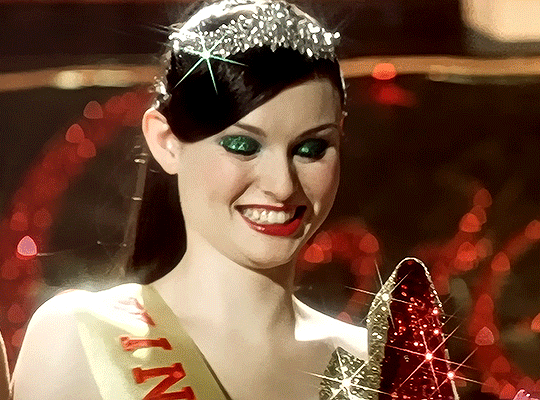

SOPHIE ELLIS-BEXTOR
Murder on the Dancefloor (2001)
#sophie ellis bextor#sophie ellis-bextor#murder on the dancefloor#dailymusicians#dailymusicqueens#usermusic#dailywomen#flawlessbeautyqueens#chewieblog#userbbelcher#userpcultures#blogmusicdaily#femaledaily#popularcultures#gifs#mine#*
471 notes
·
View notes
Text


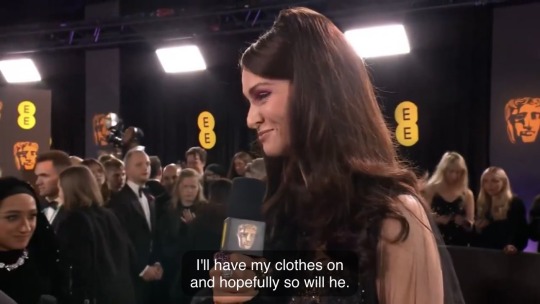
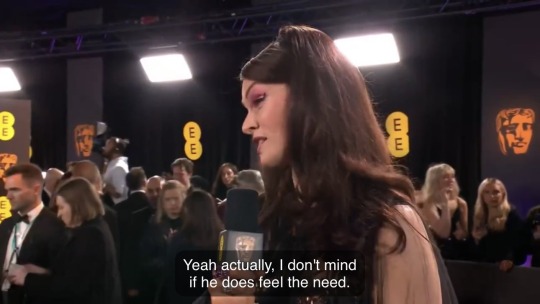
Sophie Ellis-Bextor on the BAFTA red carpet talking about performing Murder On The Dancefloor in front of Saltburn’s Barry Keoghan at tonight’s ceremony
#saltburn#barry keoghan#jacob elordi#emerald fennell#saltburn 2023#saltburn movie#ewan mitchell#alison oliver#archie madekwe#richard e. grant#rosamund pike#Sophie Ellis-Bextor#murder on the dancefloor#bafta#baftas#2024 baftas#baftas 2024#sophie ellis bextor#awards
252 notes
·
View notes
Text

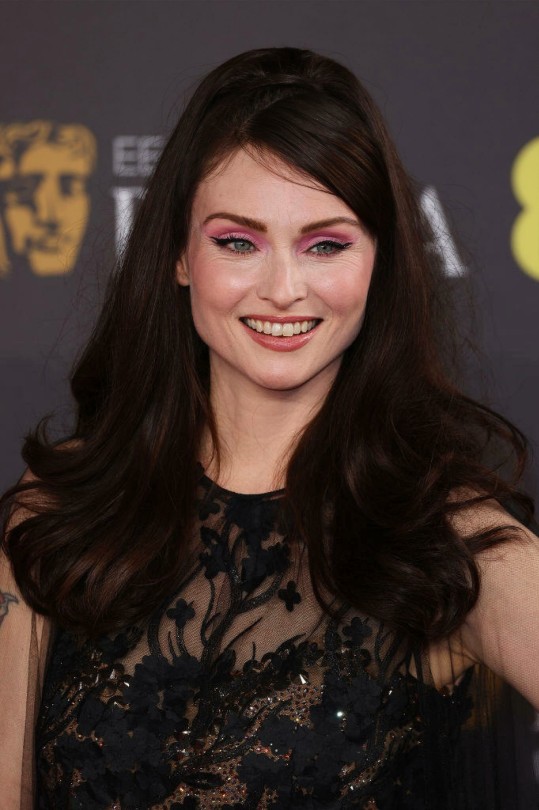
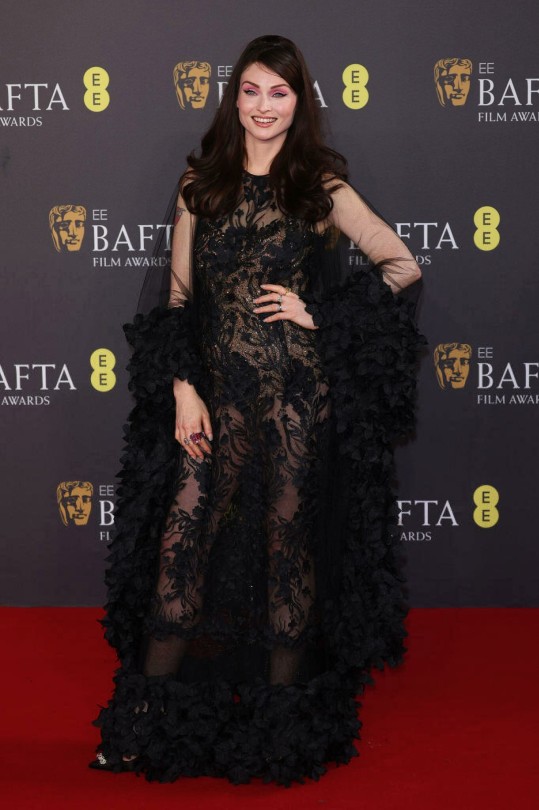
SOPHIE ELLIS-BEXTOR attends the 2024 BAFTA Film Awards
#sophie ellis bextor#sophie ellis-bextor#dailywomen#femaledaily#dailymusicians#flawlessbeautyqueens#femalestunning#dailymusicqueens#britishladiesdaily#breathtakingqueens#she is so gorgeous
125 notes
·
View notes
Text
'What a night at the Bafta film awards. And we're not just talking about Oppenheimer picking up the most prizes.
David Tennant brought a dog, Barry Keoghan showed his love for Sophie Ellis-Bextor and our favourite US star Da'Vine Joy Randolph cracked on to Chiwetel Ejiofor. We're here for it...
...best supporting winner Downey Jr said he owed his award in part to Oppenheimer director Christopher Nolan's "British sensibility".
Shout-out to the Oppenhomies
Best actor winner Cillian Murphy probably made his teenage sons cringe when he thanked his "Oppenhomies" in his acceptance speech but we loved it.
He's the first Irish-born performer to win a best actor Bafta and said, "I'm a really proud Irishman, it means a lot." He added: "People have come up to me on the street and said they've seen the film [Oppenheimer] five, six, seven times... it's very humbling... and it's been a brilliant year for cinema."
At three hours long, six or seven times might be just a bit too much.
Tennant triumph
Host David Tennant was an all-round success this year, with his natural enthusiasm proving infectious and a genuinely funny script. And how many men could get away with a combo of kilt, sporran and sparkly epaulettes?
He also brought a DOG to the Baftas. Bark Ruffalo, geddit? Loving the canine theme this awards season. We're only just getting over the dog from Anatomy of a Fall rocking up to the Oscars luncheon last week.
Tennant also had fun with the Barbie crew, introducing "the ugly corner" as the camera panned to gorgeous pair Margot Robbie and Ryan Gosling in the audience. Signing off the show with "Come on Barbie, let's go party" was also a highlight...'
#Oppenheimer#Barbie#David Tennant#Ryan Gosling#Bark Ruffalo#Margot Robbie#Cillian Murphy#Robert Downey Jr.#BAFTAs#Da'Vine Joy Randolph#Sophie Ellis-Bextor#Christopher Nolan
50 notes
·
View notes
Text
btw the dj is crying for help because there was a murder on the dancefloor
23 notes
·
View notes
Text

Sophie Ellis-Bextor photographed by Alexi Lubomirski, 2006
#2006#2000s#y2k#singer#model#photoshoot#fashion#style#famous#celebrity#hair#makeup#magazine#sophie ellis bextor#sophie ellis-bextor
31 notes
·
View notes
Text

Sophie Ellis-Bextor
30 notes
·
View notes
Text
Following the iconic dance scene in cult-film 'Saltburn', 2001's smash-hit 'Murder On The Dancefloor' has recaptured hearts (and the charts) in 2024. The song features in over 300,000 TikTok videos, including one featuring someone you may recognise wearing sequins and antlers.
“It actually feels really magical, and if I’m honest, I don’t think I’ve completely processed it really. It’s a song I’ve been singing for over 20 years. I still love singing it. I love the way people react when I do it live. But for new people to be discovering it, for it to be making new memories with people, is kind of beautiful"
- Sophie Ellis-Bextor
With its resurgence, we're excited to announce that 'Murder On The Dancefloor' is now available to pre-order on limited edition blood red 7" vinyl and as a CD single. The 7" features the track as well as the Jewels & Stone Mix Edit with the CD also featuring the Danny D Remix alongside the Extended Album version. Both are to be released on February 16th.
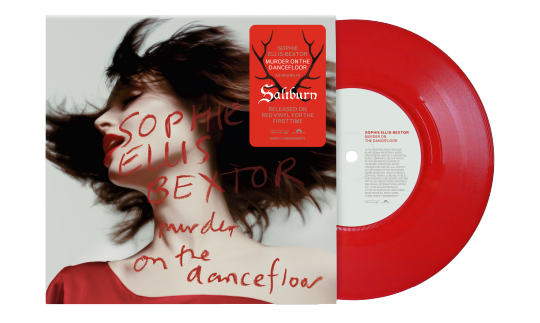
Pre-order the 7" here: https://sophieellisbextor.lnk.to/MOTD_LPWE
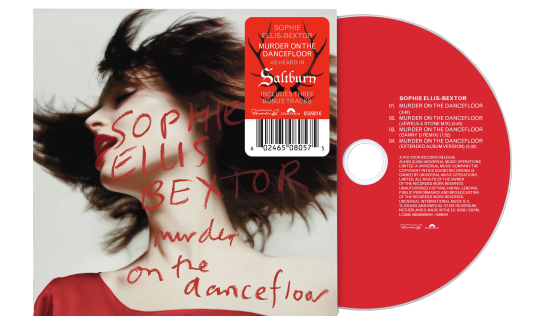
Pre-order the CD here: https://sophieellisbextor.lnk.to/MOTD_CDWE
14 notes
·
View notes
Text
SOPHIE ELLIS-BEXTOR - "MURDER ON THE DANCEFLOOR" (2001) (2024)
youtube
23 years on and this groove's still got some life in it...
[7.11]
Thomas Inskeep: Sophie Ellis-Bextor should've been the next Kylie — and for a couple years, almost was. Her 2001 debut album Read My Lips spun off a trio of top 3 singles in the UK, including this one, which has over time become her true classic. Dua Lipa's entire career was birthed in this single, the dictionary definition of ebullient dance-pop. (It's fitting that Lipa's "Houdini" is currently the most-played song on UK radio as this single is re-ascendant.) SEB has never gone anywhere: she's still making music, touring (based on her 2022 Sophie Ellis-Bextor's Kitchen Disco (Live at the London Palladium), she still sounds great), and is now a DJ on BBC Radio 2. She just didn't become the massive pop star she deserved to be. Now, thanks to its placement in a climactic scene in Saltburn, her greatest single is getting its flowers, climbing back up to #2 in the UK (so far — my fingers are crossed it can make it that final notch higher). "Dancefloor" still sounds fresh, certainly fresher than the glut of '90s-sampling dance-pop dominating the UK charts. This single sparkles, SEB giving a knowing wink as she sings, especially on the line "gonna burn this goddamn house right down." She knows what she's doing here: making magic.
[10]
Edward Okulicz: I bought this on single back in 2002, which tells you something (other than that I am old): it was an irresistible bit of sparkly disco radio pop back in the day. Move it forward or backwards a few years and it might have been an indie rock song for someone else, a filter house record, or (gulp) a Ronan Keating record. Fortunately that never occurred, and it's a delight to see a classic gain new fans from age groups and territories that didn't get it on saturation rotation. Part of it's the solid song by Gregg Alexander, who at his best was a master craftsman of a much-maligned form. Another part of it's the much nimbler, slinky production compared to the rest of his soft-rock oeuvre. And a very, very large part of it is the Debbie-Harry-but-English pose of Ellis-Bextor, too cool to do anything but be filmed dancing from the waist up while she stomps her heel into your eardrums. "Murder" really has everything — a catchy chorus, the tinniest guitar solo ever, hooks that fall as much off the words as the melody — and so is perfect for every occasion, even a movie I am never, ever going to see.
[10]
Alfred Soto: Like the Pet Shop Boys' "Rent," waaayyyy too good for Saltburn — perhaps Emerald Fennell thought their incandescence would rub off on her as if it were glitter. Part of a vanished climate of French house-inspired crossover pop like Kylie Minogue's "Love at First Sight," Sophie Ellis-Bextor presages Katy B's regular-person anonymity: she surveys the strings and rhythm guitar licks like a party hostess keeping an eye on the band while sipping her prosecco.
[8]
Alex Clifton: I haven't seen Saltburn and frankly have no interest in it, but this film has led to the Sophie Ellis-Bextor renaissance which is a net good for society. "Murder on the Dancefloor" is just brilliantly composed and produced; it feels as fresh today as it did twenty years ago. There are so many thrilling little moments from Ellis-Bextor's vocal delivery: the way her voice curves into "about your kiiiiiind," the little rasp in "there may be others," the little trill of "dancefloor" in the bridge. I feel so biased writing this review because I've literally been listening to this song since I was a kid, but I'm so jazzed about "Murder" finally receiving the love it deserves.
[10]
Ian Mathers: How can you not love pop music when it'll randomly do things like this, suddenly giving us a song to review from before the earliest days of the Jukebox, that is here purely because of its use in a movie that I have not seen but am informed was probably picked on the basis of Ellis-Bextor's plot arc in the music video. And if I'm not willing to go to bat for it quite as hard as I would for "Running Up That Hill," I did love "Murder on the Dancefloor" in 2001 and it still sounds great now. I don't find myself having any reaction more complicated than happiness at hearing it again and that particular joy of people liking something you like.
[8]
Nortey Dowuona: If you told me this came out in 2021 and Emerald Fennell asked Sophie to use it in her movie set in 2001 because it was just that on point in depicting the time, I would agree. Then after taking out my phone, I'd be punched in the face and meekly give up my phone. Then, after watching you sprint into a nightclub, I'd immediately thank goodness you didn't ask for the passcode and run like hell for the closest subway. I am three stops from home before I remember this did not actually come out in 2021; there are other Sophie Ellis-Bextor songs and jailbreaking is a thing now.
[10]
Leah Isobel: RIP Mark Fisher. You would've written a hell of a blog post about Saltburn.
[7]
Mark Sinker: Necessary digression 1: heraldry as a science in Europe is roughly 900 years old, a bright and stylised easy-read guide, highly rule-bound and policed, to class and land and title — which is to say to material history (its jargon-field is still mostly words not otherwise used in the UK since the 14th century; even property law is less lousy with extinct Norman French terms). And like many very aged things, it has necessarily also passed through phases and fashions, as technologies of display arrive and depart. In fact the first inkling I had that I wasn’t going to get on with Saltburn was the typeface chosen for the title on-screen at the outset. It’s a font with a fairly specific ill-set ungainliness to it: it wants to have the weight of "pleasingly and weirdly old; not how we do things now," but it might just as well be some off-the-peg super-modern studio confection — or even (though I slightly doubt this) something custom-fashioned purely for the film. There’s no discernible care to the choice. Necessary digression 2: back in the late '70s when Peter Saville was busily and insouciantly borrowing from this or that actual-real document or design, of such-and-such era, part of the point was the severity of the decontextualisation — except there was a rigour to the carelessness. The item was being supplied with an iconicity (the very word) pulling you in towards whatever the item was that Factory Records was then placing on the market. The surface glamour of the original was to be funneled through in such a way that its weight amplified only the new relationship. In fact (in its stylised easy-read way) Saville’s work was ruthlessly the opposite of heraldry, so very good at managing the ambient melancholy that suffuses the wider Factory moment; all the blocks and counterspells necessary to conjure here beyond the end of creative time as the context for the music to have presence. Anyway, long story short (lol) Saltburn – which would love to believe it has accessed the aura, for example, of the cover of New Order’s Technique — is attempting to juggle the same double burden. It wants to conjure a play between the decontextualised pull of 24-hour-party-people hedonism and the real ineluctable unremovable weight of actual history and actual class and actual land and actual title. Except for its story to work it needs both dimensions (hedonism and weight; heraldry and careless scribble) to register, as Saville absolutely didn’t. No block, no counterspells, nothing to dampen the disturbances — so when poor old Sophie EB’s voice and poise are scalpeled out of their 20-year-old chart context and abruptly c/p-ed into whichever late-stage scene it is, well, here they are, as a clumsy synopsis (calculation, side-eye, dancing, death) the structure really shouldn’t require, in a role the song is the wrong mood (a faintly gauche trifle, a chirpy hustle) to deliver. The movie never works out where it gets its deep reveal from, or what shape its politics are (if politics is even a useful word here). Ill-set ungainliness all over again: the carelessness floods back into the borrowed adornment, and breaks it in pieces. I don’t even love this song that much but I hate how it gets what value it has so gracelessly driven out of it.
[2]
Jacob Satter: At the risk of killing the groove, this is a pretty boring choice for a manufactured revival track. Call me back when the kids discover "It's In Our Hands."
[4]
Jacob Sujin Kuppermann: I'm glad everyone's having fun here but the more I try to enjoy this — either on its own terms or as an icon of nostalgia — I get nothing. Unremarkable in any year.
[4]
Lauren Gilbert: It was a [10] in 2001, it's still a [10] now.
[10]
Katherine St. Asaph: The thing about it being 2024 is that in the intervening 20-plus years since "Murder on the Dancefloor" came out, approximately ninety million more disco-revival tracks came out. Some of them are by Sophie Ellis-Bextor, even. And so many of those tracks are smooth where this is stiff, magisterial where this is timid (and not in a winsome Katy B kind of way; Katy got better arrangements), charged where this is inert and just generally unmurderous. It's actually startling how inessential this sounds by comparison.
[3]
Oliver Maier: Even as a youth, before my brain was burdened with indulgent critical vocabulary, I felt like this song just didn't work. I can't pin down whether "Murder" is knowingly a little chintzy (dare I say camp?) or if it's just cheap tat trying sincerely to sound boutique. Benefit of the doubt granted or not, Ellis-Bextor sounds like she's doing karaoke off the sofa.
[4]
Michael Hong: When Ellis-Bextor pauses, it's easy, like a quick and graceful end to a conversation rather than the expectant response to her more spirited word choice. She's committed to this casualness, easily slipping away at the hint of a faux pas, which makes the occasional lingering word more charming. "About your kind," she sings, as if looking you up and down, wondering if she's got it wrong this time; the word "others" is trailed as if she's daring you to eliminate the competition. In that way, "you better not kill the groove," delivered with such nonchalance, becomes a fervid instruction.
[7]
Will Adams: It's cute, Sophie is ever-charming, but there's real problem when you've got songs in your catalog with titles like "Bittersweet" and "Heartbreak Make Me a Dancer" that offer way more palpable drama than the one with the word "Murder."
[5]
Joshua Minsoo Kim: Every other line is threatening here. “Stay another song,” “Don’t think you’ll get away,” “You better not kill the groove.” Sophie Ellis-Bextor isn’t demanding fear, though. That’s what makes “Murder on the Dancefloor” so irresistible: she sounds like a friend, albeit one who’s deathly serious about having a good time. When you hear her, you believe it can be this good for you too.
[8]
Taylor Alatorre: Wow. They were allowed to make these slick disco-pop reimaginings with actual guitar solos back then? We must retvrn.
[8]
Tara Hillegeist: It feels like a time capsule from another era in pop music entirely, because it is. There was a time when Ellis-Bextor's stately, imperial, nigh-inhuman precision of a delivery felt like nothing so much as the edifice within which pop star royalty could be crowned, particularly in the world of UK pop; it's still hard, even now, to deny the simple pleasures of someone who knows what her job is and then executes it flawlessly. But it's been over two decades since this song originally bowed, and it must be said that it was the impact of songs like, yes, "Murder" itself that raised pop music's skill floor high enough that such icy professionalism now feels like the most tiresome part of it — Dua Lipa does this regularly, after all, and with equal anonymity. No, what saves it, and ensures the song remains nothing so much as a delightful diversion (conditions of its resurgence be damned, I say), are the sampled whoops that come in beneath the guitar solo; notwithstanding that such a slice of controlled disco can credit itself with having a guitar solo to begin with, but the canned hype is such a stupendously goofy touch. It humanizes the song instantly, stripping the archness of its artifice aside to reveal the awkward smile underneath. The moment passes, of course. But the smile lingers.
[7]
Anna Katrina Lockwood: I've been waiting 20+ years for an opportunity to issue a dissertation on the songwriting genius of Gregg Alexander and by god am I ready. Though it's hard to imagine it in a different form, "Murder on the Dancefloor" was apparently a cast-off single for Alexander's New Radicals debut, replaced by the equally glorious "You Get What You Give" — like, imagine being such a talented songwriter that you can just cast off a song like this, knowing you've got an equally great one to replace it with! "Murder on the Dancefloor" is just perfection in Ellis-Bextor's hands, with a galaxy of terrific choices in its production to go along with the amazing melodic structure. I still can't help but burst out laughing at the initial vocal hit in the intro on occasion, a perfect, delicately harmonized coo of "Murder!," cutting through the disco instrumental setup occurring all around. It's as great a moment of pop songwriting as I'm aware of — setting the expectation of the song's vibe from the outset. Ellis-Bextor's lyrics are outstanding, cleverly arch but not too shiny, in the thick of it yet also gliding past suavely. The song is incredibly detailed, a carefully calibrated piece — it lopes by with a relaxed stride rather than a reckless dash, a well-tailored Savile Row suit as opposed to an H&M tunic, cut to the millimeter. Yet it's also very clearly of the disco, built for singing along, difficult to avoid dancing to when it comes on. It turns on its heel at moments' notice, with layers of melody playing off each other throughout. Matt Rowe's efforts in production also deserve notice — this song sounds great, so distinctive that it is still eminently listenable 23 years on. I honestly have not a single thing to criticize about "Murder on the Dancefloor," and it's been a long time that I've considered it to be one of the truly great pop songs of my lifetime. It feels like incredibly just desserts to see it garnering so much praise now.
[10]
[Read, comment and vote on The Singles Jukebox ]
#sophie ellis-bextor#saltburn#music#pop#pop music#music writing#music reviews#music criticism#the singles jukebox#Youtube
7 notes
·
View notes
Text
I recently watched Saltburn and... damn. Um. That was a journey. Anyways, Murder On The Dancefloor is an absolute bop.
#spotify#murder on the dancefloor#sophie ellis-bextor#song rec#saltburn#it sounds like a song that would play in a macy's idk why
11 notes
·
View notes
Text
4 notes
·
View notes
Text
❄︎ my back will never break ❄︎
2 notes
·
View notes
Text
youtube
Sophie Ellis-Bextor, "Murder on the Dancefloor"
When I say that I am old enough to have burned this song onto CDs, just know that I am cringing inside; but thank you, Emerald Fennell and Barry Keoghan, for bringing it back.
4 notes
·
View notes
Text
'Last night, at the Bafta awards, actor Andrew Scott was interviewed by the BBC on the red carpet. In an exchange that viewers have branded “awkward” and “inappropriate,” Scott – who stars in gay fantasy drama All of Us Strangers, which was up for several awards – was asked by entertainment correspondent Colin Paterson about a specific scene – the finale – in Saltburn.
If you haven’t seen it, look away now – but it involved Barry Keoghan running around a mansion naked, while Sophie Ellis-Bextor’s “Murder on the Dance Floor” plays overhead. Paterson first asks Scott: “Do you know Barry well?” When Scott says he does know him, Paterson says: “Your reaction, when you first saw the naked dance scene?” Scott awkwardly laughs and responds “it’s great, it’s great”. “You can spoil away!” Paterson prompts again, to which Scott finally says: “no, I won’t spoil it for anybody.”
The exchange is already uncomfortable by this point, but then Paterson asks another question: “There’s been a lot of talk about prosthetics…” Then, somewhat suggestively, he asks: “How well do you know him?” At this point, Scott walks off. Sensing he’s gone too far, the interviewer shouts “Too much? Too much?” after him. The clip is excruciating to watch.
Viewers have slammed the interview – and it’s easy to see why. It seems like a strange choice to probe Scott – one of the very few gay actors on the red carpet – about Keoghan’s genitalia, or insinuate he might know what his penis looks like. (Does he think there is some sort of Irish actors nudist club, to which they are all a member?) It’s also bizarre because, if he wanted to ask Scott about nude scenes, specifically, there were plenty to choose from All of Us Strangers – where he stars alongside Paul Mescal.
Watching the clip, I can understand why gay fans in particular are unhappy with the line of questioning. It taps into an overfamiliarity a lot of us might have experienced, often from complete strangers, when it comes to sex. Straight people – particularly men, in my experience, after a few drinks at parties and weddings – can feel entitled to ask some pretty graphic sexual questions. Some might say this is just curiosity – a form of acceptance, even. Maybe that’s true, but sometimes it can also feel intrusive. There is a subtle homophobia in assuming all gay men are sex-obsessed – or will leap at the chance to talk about other men’s penises.
It is very possible that Paterson wasn’t aware of these dynamics. It might not have occurred to him that Scott is gay. But that in itself is an issue: As journalists, we have to be mindful that our questions don’t always come across as neutral, or without prejudice, to the people we’re talking to. Questions, like people, don’t exist in a vacuum – their appropriateness often depends on who is asking and answering them. It can be a delicate balance – and there was nothing delicate about this interview.
It is common for red carpet interviews to take on a much more informal tone than a magazine or newspaper profile. These chats are all about the buzz of the night and giving the audience a glimpse at the glamour. The excitement of it all. The gossip!
Since awards shows started live streaming on social media, I’ve noticed that red carpet interviews have become increasingly geared towards chasing a viral “moment.” Sometimes it’s harmless fun, like when Amelia Dimoldenberg and Andrew Garfield gave the world a masterclass in the toe-curling yet adorable art of British flirting at last year’s Golden Globes. But when fleeting exchanges have the potential to become huge viral clips in the content stream, it’s also easy to see how some questions might be ill-judged in the pursuit of online engagement. This feels like one of them.
That said, red carpet interviews are a very tough job. (Seriously, underestimate it at your peril.) For reporters, there are hundreds of actors and creatives – each with a different reason for being there and a different project to plug. There’s a wide variety of temperaments (and egos) to juggle, too. Remember at last year’s Oscars, when Hugh Grant was accused of being “rude” to Ashley Graham? You could see the fear in Graham’s eyes when confronted with Grant’s curt British responses, as she seemed unable to steer the interview out of awkward territory.
Still, the more informal and off-the-cuff format of red carpet interviews can also be a microcosm of wider industry inequalities. In 2015, Cate Blanchett called out E!’s “glam cam” as it panned up and down her dress during an interview. She stopped the interview and said: “Do you do that to the guys?” She later said: “[People] forget the fact that women are up there because they’ve given extraordinary performances.”
With Scott’s interview, it feels like just that. His own performance in an immensely moving film was pushed to the side in favour of a crass moment – one that felt beneath everyone involved. Watching the exchange, Scott’s fans see a gay actor being put in an uncomfortable situation and, crucially, not getting the respect he deserves. Maybe there’s a wider industry message there, too.'
#Andrew Scott#BAFTAs#Cate Blanchett#All of Us Strangers#Barry Keoghan#Saltburn#Murder on the Dancefloor#Sophie Ellis-Bextor#Paul Mescal
8 notes
·
View notes
Text
"Murder on the Dancefloor"
Original by Sophie Ellis-Bextor
Covered by Sløtface
2 notes
·
View notes
Text

Sophie Ellis-Bextor (2023)
13 notes
·
View notes